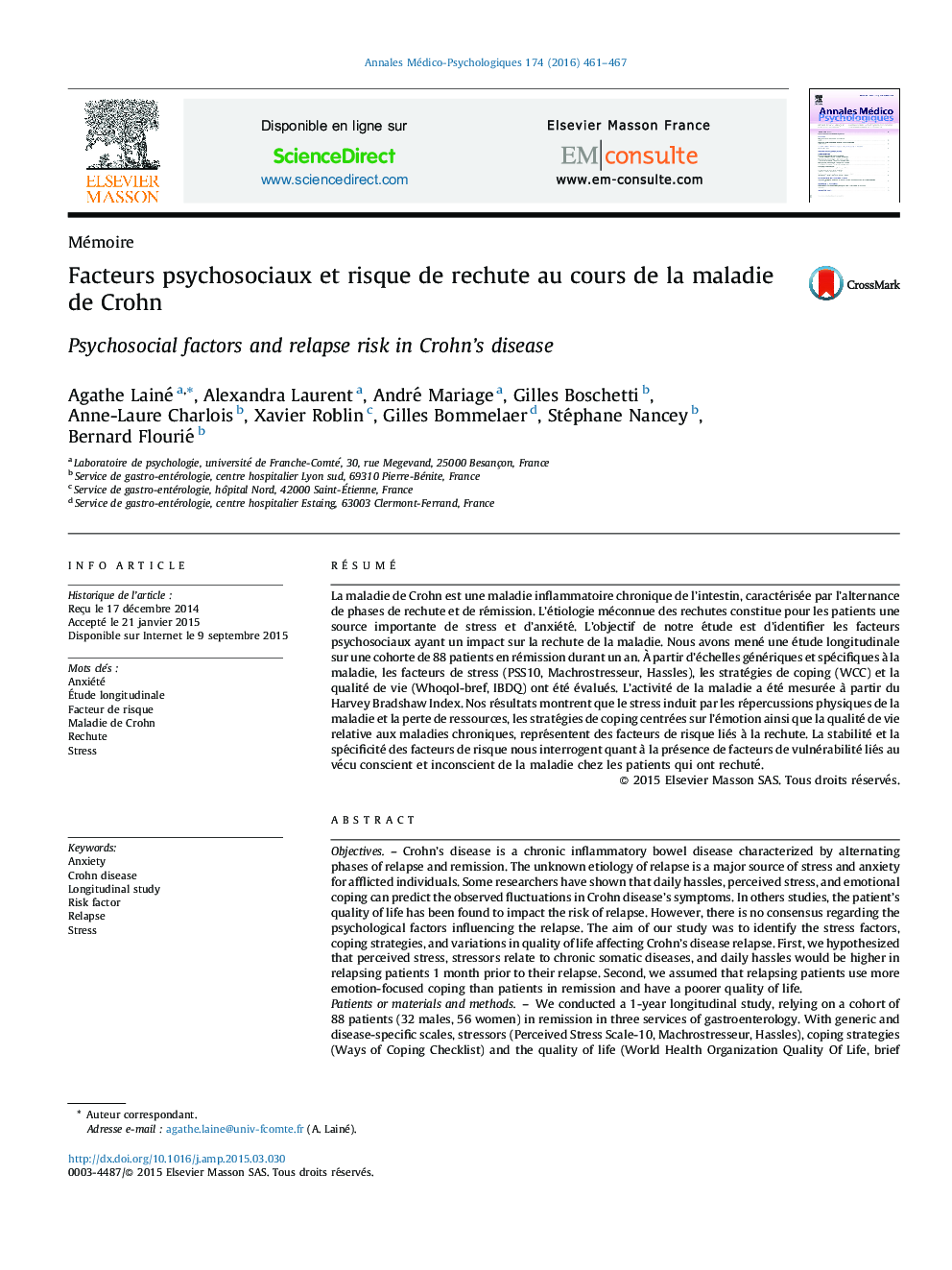| کد مقاله | کد نشریه | سال انتشار | مقاله انگلیسی | نسخه تمام متن |
|---|---|---|---|---|
| 313321 | 1432387 | 2016 | 7 صفحه PDF | دانلود رایگان |

RésuméLa maladie de Crohn est une maladie inflammatoire chronique de l’intestin, caractérisée par l’alternance de phases de rechute et de rémission. L’étiologie méconnue des rechutes constitue pour les patients une source importante de stress et d’anxiété. L’objectif de notre étude est d’identifier les facteurs psychosociaux ayant un impact sur la rechute de la maladie. Nous avons mené une étude longitudinale sur une cohorte de 88 patients en rémission durant un an. À partir d’échelles génériques et spécifiques à la maladie, les facteurs de stress (PSS10, Machrostresseur, Hassles), les stratégies de coping (WCC) et la qualité de vie (Whoqol-bref, IBDQ) ont été évalués. L’activité de la maladie a été mesurée à partir du Harvey Bradshaw Index. Nos résultats montrent que le stress induit par les répercussions physiques de la maladie et la perte de ressources, les stratégies de coping centrées sur l’émotion ainsi que la qualité de vie relative aux maladies chroniques, représentent des facteurs de risque liés à la rechute. La stabilité et la spécificité des facteurs de risque nous interrogent quant à la présence de facteurs de vulnérabilité liés au vécu conscient et inconscient de la maladie chez les patients qui ont rechuté.
ObjectivesCrohn's disease is a chronic inflammatory bowel disease characterized by alternating phases of relapse and remission. The unknown etiology of relapse is a major source of stress and anxiety for afflicted individuals. Some researchers have shown that daily hassles, perceived stress, and emotional coping can predict the observed fluctuations in Crohn disease's symptoms. In others studies, the patient's quality of life has been found to impact the risk of relapse. However, there is no consensus regarding the psychological factors influencing the relapse. The aim of our study was to identify the stress factors, coping strategies, and variations in quality of life affecting Crohn's disease relapse. First, we hypothesized that perceived stress, stressors relate to chronic somatic diseases, and daily hassles would be higher in relapsing patients 1 month prior to their relapse. Second, we assumed that relapsing patients use more emotion-focused coping than patients in remission and have a poorer quality of life.Patients or materials and methodsWe conducted a 1-year longitudinal study, relying on a cohort of 88 patients (32 males, 56 women) in remission in three services of gastroenterology. With generic and disease-specific scales, stressors (Perceived Stress Scale-10, Machrostresseur, Hassles), coping strategies (Ways of Coping Checklist) and the quality of life (World Health Organization Quality Of Life, brief version, Inflammatory Bowel Disease Questionnaire) were assessed. Each month during 12 months, patients defined their level of stress and their use of coping strategies, from autoquestionnaire. Quality of life was only assessed at inclusion time. The disease activity was measured with the Harvey Bradshaw Index. At inclusion time, all patients were in remission. Resection antecedents and frequency of relapse were controlled for. The patient sample was divided into two groups: a remission group and a relapsing group. Using Student's t test, we compared the stress, coping, and quality of life scores of the two groups at baseline and 1 month prior to the relapse. When significant between-groups differences were found, risk factors were estimated with odds ratios.ResultsOf the 88 patients, 26.1% relapsed. There was no between-group difference in disease duration, gender, resection antecedents, or relapse frequency. Our results showed that the specific stress induced by the physical impact of the disease (OR = 3.53; 95% CI: 1.07–11.68) and the loss of resources (OR = 4.98; 95% CI: 1.35–16.93) at baseline and 1 month prior to the relapse (OR = 2.91; 95%: 1.00–8.46; OR = 5.98; 95% CI: 1.80–19.77) were risk factors. We found no between-group difference regarding perceived stress and daily hassles. The use of emotion-focused coping strategies increased the risk of relapse 1 month prior to the relapse (OR = 5.63; 95% CI: 1.69–18.72), in contrast with problem-focused focus coping or social support seeking. Disease-specific, but not generic quality of life factors were risk factors for relapse (OR = 6.33; 95% CI: 1.79–22.39). Indeed, we observed that patients with a poorer quality of life related to digestive system problems were at increased risk of relapse (OR = 3.33; 95% CI: 1.06–10.44). Moreover, the quality of life related to emotions (OR = 8.80; 95% CI: 0.83–89.12) and social consequences (OR = 69.93; 95% IC: 2.03–23.63) appeared as risk factors for relapse.ConclusionThe psychosocial factors associated with chronic disease are the best predictors of relapse in Crohn's disease. Except emotion-focused coping, the psychological risk factors for relapse are specific of chronic disease. A poorer quality of life increases the relapse of Crohn's disease, like the chronic disease stressors. Our study shows that the impact of stressors and quality of life on relapse is stable, at inclusion time and 1 month prior to the relapse. Concerning the stability and specificity of risk factors, the vulnerabilities related to the conscious and unconscious experience of the disease in patients who have relapsed are discussed. Stressors related to physical repercussions, loss of resources and emotion-focused coping could be explained by a difficulty in elaborating the experience of the illness. This study sheds new light on relapse vulnerabilities and on therapies for patients.
Journal: Annales Médico-psychologiques, revue psychiatrique - Volume 174, Issue 6, July 2016, Pages 461–467